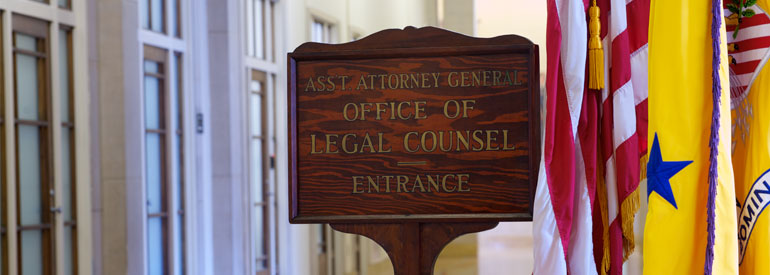
The President should be indicted and tried promptly for any criminal offense he may have committed whether before or after taking office.
Eighteen years ago the elite Justice department unit that advises the White House and the Department itself on matters of constitutional law - the Office of Legal Counsel issued an opinion on the possible indictment and prosecution of a president. The Constitution forbids it the OLC said because it would so directly interfere with the work of the entire executive branch as to be impermissible.
First, the OLC finds no support in the plain language of Article 1 of the Constitution which declares the powers of Congress:
Judgment in cases of impeachment shall not extend further than to removal from office, and disqualification to hold and enjoy any office of honor, trust or profit under the United States: but the party convicted shall nevertheless be liable and subject to indictment, trial, judgment and punishment, according to law.
The OLC argument makes two fatal errors. First it entirely identifies the work of the executive branch with the person of the President. The executive branch is not simply an arm of the President. Its officers and employees have sworn to uphold the Constitution and laws of the United States.
The OLC recognizes that Presidents can commit crimes before or after assuming the office. Unable to assert that President should escape liability (see Article 1, above) for criminal acts the OLC argues that a court could equitably toll (i.e. pause) the running of the relevant statute of limitations while (s)he held office. In this Slate magazine essay Fordham legal historian Jed Shugerman demonstrates persuasively that the courts have no such power.
My concerns follow from Shugerman's conclusion that prosecution may not be "equitably" stayed. Both defendants and prosecutors want to move prosecutions without delay. Both have an interest in preservation of evidence and the availability of witnesses. Defendants' interest in liberty and the constitutional mandate of due process are expressed in many ways. the Speedy Trial Act is one. But the deeper problems are that a prosecution substantially delayed creates the risk of prejudice to the defense.
Further being under the shadow of indictment itself substantially burdens a President's effectiveness. We saw this during the impeachment scandal involving President Bill Clinton who had concealed a sexual liaison with a young intern. The public interest in resolving allegations of Presidential criminality is for prompt resolution of the charges.
The solution I urge is that the President should be indicted and tried promptly for any criminal offense (s)he may have committed whether before or after taking office.- GWC
Should President Trump be above the law because of the statute of limitations?: Should a president be above the law because of the statute of limitations?
by Jed Shugerman
Last week, prosecutors in the U.S. District Court for the Southern District of New York alleged in court filings that Donald Trump directed his former personal attorney, Michael Cohen, to make hush money payments that violated campaign finance laws. The prosecutors recommended serious prison time for Cohen, and commentators remarked widely that Trump could be facing his own indictment if he were not president, because the Department of Justice has a policy of not indicting a sitting president. But this news highlights a major problem with this policy: statutes of limitations. The intractability of that problem is a compelling argument for why prosecutors must be able to indict a sitting president. Otherwise, a president could escape prosecution for many felonies by running out the clock.
KEEP READING
No comments:
Post a Comment